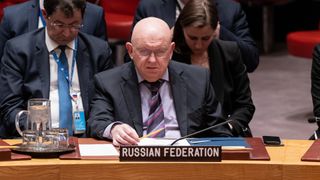
Ambassador Vassily Nebenzia of Russia attends a UN Security Council meeting on April 2, 2024.
(Image credit: Lev Radin/Pacific Press/LightRocket via Getty Images)
Russia vetoed a United Nations resolution that was aimed at preventing a nuclear arms race in space.
The resolution was sponsored by the United States and Japan and called upon all nations to never deploy nuclear weapons in outer space. The resolution comes on the heels of recent reports that Russia is developing a nuclear anti-satellite weapon of some kind. The furor caused by the reports led the White House to issue a statement that the rumored weapon poses “no immediate threat to anyone’s safety.”
Thirteen nations, including the United States, voted in favor of the resolution. Russia was the only vote against, while China abstained, meaning it did not vote one way or the other. Russia’s ambassador to the U.N., Vassily Nebenzia, called the resolution a “dirty spectacle” and a “cynical ploy,” according to the Associated Press.
Related: Russia’s nuclear anti-satellite weapon poses ‘no immediate threat’ to Earth, White House says
After Russia’s move to block the resolution, the U.S. ambassador to the U.N., Linda Thomas-Greenfield, questioned why Russia would veto such a proposal.
“Today’s veto begs the question: Why? Why, if you are following the rules, would you not support a resolution that reaffirms them? What could you possibly be hiding?” Thomas-Greenfield asked after the vote.
However, despite vetoing and abstaining from approving the resolution, respectively, Russia and China actually proposed an amendment to the resolution that calls upon all nations to “prevent for all time the placement of weapons in outer space, and the threat of use of force in outer space.” Seven countries voted in favor of the amendment, seven voted against, and one abstained.
Breaking space news, the latest updates on rocket launches, skywatching events and more!
The United States was one of the countries that voted against the amendment.
Nebenzia then levied his own questions at the U.S. “We want a ban on the placement of weapons of any kind in outer space, not just WMDs [weapons of mass destruction],” the Russian ambassador said. “But you don’t want that. And let me ask you that very same question: Why?”
It could be that while the United States wants to prevent a nuclear arms race in space, American military leadership is fine with other types of weaponry in space, particularly when it comes to anti-satellite capabilities.
In September 2023, the U.S. military’s Defense Advanced Research Projects Agency (DARPA) asked private companies to help it find new solutions to achieve “space superiority,” meaning ways to project U.S. military power in space. The U.S. Space Force also recently activated a unit tasked solely with targeting adversary satellites and has conducted “simulated on-orbit combat engagements” during training exercises.
Russia has likewise been testing some eyebrow-raising capabilities in recent years. In August 2022, the Russian satellite Cosmos 2543 deployed another object into orbit. In a statement, the U.S. Space Force called the move evidence of “Russia’s continuing efforts to develop and test space-based systems, and consistent with the Kremlin’s published military doctrine to employ weapons that hold U.S. and allied space assets at risk.”
Russia has even made threats against Western commercial satellites, calling them a “legitimate target” for military attacks.
Join our Space Forums to keep talking space on the latest missions, night sky and more! And if you have a news tip, correction or comment, let us know at: [email protected].
Brett is curious about emerging aerospace technologies, alternative launch concepts, military space developments and uncrewed aircraft systems. Brett’s work has appeared on Scientific American, The War Zone, Popular Science, the History Channel, Science Discovery and more. Brett has English degrees from Clemson University and the University of North Carolina at Charlotte. In his free time, Brett enjoys skywatching throughout the dark skies of the Appalachian mountains.
>>> Read full article>>>
Copyright for syndicated content belongs to the linked Source : Space.com – https://www.space.com/russia-nuclear-weapons-space-veto-un-resolution










